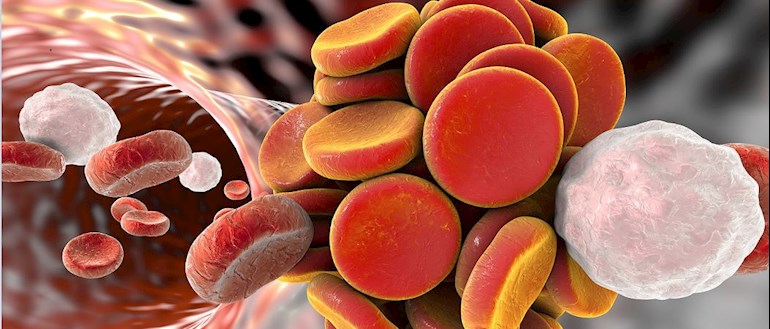Gregory M. Weiss, M.D.
October 15, 2019
Fifty percent of people with systemic lupus erythematosus (SLE) have anti-phospholipid antibody syndrome (APS), a condition that can lead to life-threatening blood clots and pregnancy morbidity
In a review by TS Vadgama, et al., published online July 26 in the journal Lupus, the authors evaluate primary and secondary thromboprophylaxis in patients with anti-phospholipid autoantibodies (aPL) and a history of thrombosis.
The authors highlighted seven key findings:
1) A risk-stratified approach is preferred in primary thromboprophylaxis, but aPL status, comorbidities and cardiovascular vascular need to be considered.
2) There have been good and poor results for the use of low-dose aspirin in primary thromboprophylaxis. The mixed results may be due to poorly designed studies.
3) For aPL carriers, warfarin may not work for venous and/or arterial thrombosis. It is also associated with safety concerns.
4) Hydroxychloroquine use is not entirely conclusive to date, but the preliminary data is encouraging.
5) For kidney transplant patients with secondary thromboprophylaxis, warfarin may be the best option.
6) Aspirin is not recommended.
7) The jury is out on rivaroxaban because the data, of which there is little, is contradictory.
Systemic lupus erythematosus increases the risk of blood clot formation more than eight times compared to the general population with even higher risk for re-thrombosis after an initial clot. Significant morbidity and mortality may result from Antiphospholipid syndrome related thrombosis.
While thrombosis in the general population is multifactorial, risk factors such as smoking, hypertension, diabetes, and autoimmune disease may coexist with Antiphospholipid syndrome further increasing the chance of serious blood clots.
Warfarin, a vitamin K antagonist is typically prescribed for life-long prevention in Antiphospholipid syndrome with or without aspirin. Considered the gold standard for clot prevention, the evidence for warfarin in anti-phospholipid syndrome is anecdotal or derived from low-quality trials.
The lack of solid evidence for primary and secondary prevention of thrombosis in anti-phospholipid syndrome led Dr. Smith and colleagues to review the literature in an effort to find data supporting current thromboprophylactic therapy.
Primary prophylaxis describes therapy aimed at preventing the first event of thrombosis. A review of the available literature failed to show a benefit in primary prevention of thrombosis for aspirin or warfarin in carriers of the anti-phospholipid antibody.
Studies examining hydroxychloroquine for thromboprophylaxis in lupus and anti-phospholipid syndrome have been inconclusive with some showing benefit and others showing no reduction in primary thrombosis.
Secondary thromboprophylaxis refers to prevention of venous or arterial clot formation following a primary clotting event. A review of the available data shows that standard warfarin therapy leading to a therapeutic international normalized ratio was effective for secondary thromboprophylaxis in patients with Antiphospholipid syndrome.
The data in this review failed to show a benefit in secondary thromboprophylaxis for aspirin in anti-phospholipid syndrome carriers. There are new uncontrolled trials looking at direct oral anticoagulants like rivaroxaban, apixaban, and dabigatran. Currently there is no convincing evidence that direct oral anticoagulants confer a benefit for secondary thromboprophylaxis in anti-phospholipid syndrome.
When compared with warfarin for secondary thromboprophylaxis in anti-phospholipid syndrome rivaroxaban treatment led to significantly more serious events such as bleeding, arterial and venous thrombosis and even death.
Trials are ongoing but for now there are many questions left unanswered. Aspirin in particular remains an attractive therapy for primary prevention in anti-phospholipid syndrome, however, the authors stated: “The effect of low-dose aspirin is still debated, mainly because of data coming from poorly designed studies and thus warranting larger, better-designed controlled trials.”
While warfarin appears to be the drug of choice for secondary prevention of thrombosis in this population data do not support its effectiveness for primary prevention. Hydroxychloroquine still shows promise for primary prevention in Antiphospholipid syndrome but more rigorous investigation will be needed to clarify its role.
Because the risk of thrombosis is even higher after an initial event, patients with Antiphospholipid syndrome should be on warfarin following such and event. Clinicians should monitor the international normalized ratio closely since the effectiveness of anticoagulation therapy relies on therapeutic levels. Further, patients with kidney transplants and Antiphospholipid syndrome may be reassured that warfarin therapy likely increases the chances that the kidney will stay well perfused and less likely to fail.
Clinicians should work closely with patients at high risk for clotting and educate them on the signs and symptoms of both venous and arterial thrombosis.
While conclusions can be made, especially with regards to warfarin and secondary thromboprophylaxis, the authors caution that much more research is needed to truly reveal the best treatment strategies for primary and secondary prevention of thrombosis in patients with Antiphospholipid syndrome.
REFERENCE
Vadgama, T. S., Smith, A., & Bertolaccini, M. L. (2019). Treatment in thrombotic antiphospholipid syndrome: a review. Lupus, 28(10), 1181–1188. doi.org/10.1177/09612033198...
Source: rheumatologynetwork.com/lup...
LUpus Patients Understanding & Support (LUPUS): lupus-support.org/topic/313...
